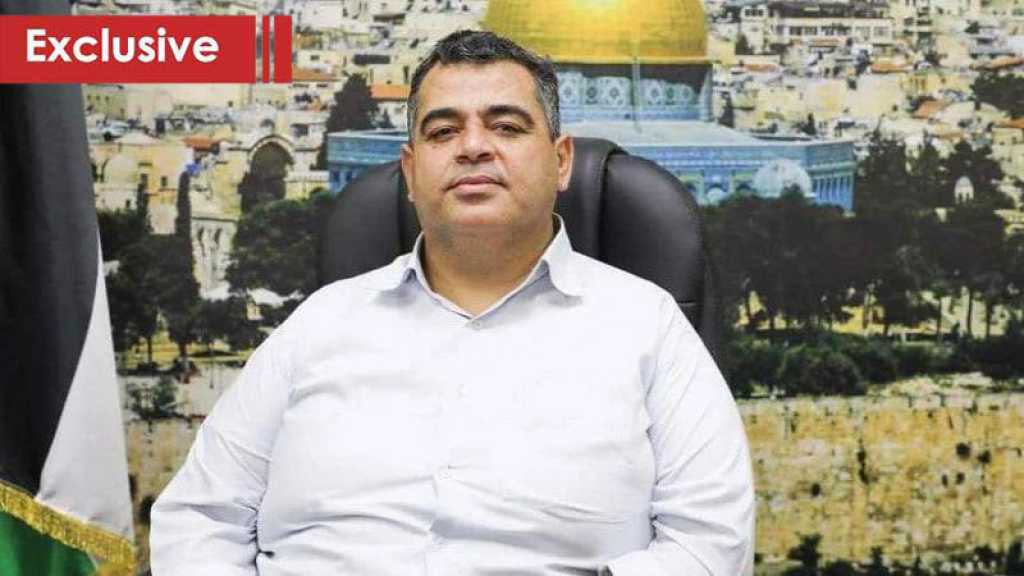
Abdul Salam Ismail Haniyeh Recounts Highlights of His Father’s Life

Mustafa Awada
The political chief of Hamas, Ismail Haniyeh, wasn’t just another leader in the history of the Palestinian cause. He was a blend of steadfastness, a strong will to resist, and political competence with merit. This is how he lived his life, starting from Al-Shati Camp in Gaza until his martyrdom. He become a symbol of his people’s resistance.
Embodying this unbreakable spirit of resistance, Haniyeh fought relentlessly for the unity of his people. He lived for Palestine and was martyred for it, fulfilling his highest aspiration. He knew that the path to freedom was paved with blood, and he believed that this pure blood would liberate the land and restore it to its rightful owners.
In an interview with Al-Ahed News, Abdul Salam Haniyeh, the eldest son of the martyred leader, told the story of a father who lived his life in search of martyrdom. He confirmed that his father’s blood was not more precious than the blood of every child in Gaza, but rather an extension of that pure blood that waters the land of Palestine.
Abdul Salam carries a deep belief that his father’s martyrdom will not extinguish the flame of resistance but will make it burn brighter in the hearts of generations. He said Ismail Haniyeh, who was focused on national unity and made it his goal until the last moment, has departed in body, but he left behind a legacy of struggle and sacrifice, remaining a symbol of steadfastness and resilience in the face of the enemy.
The martyred leader grew up in a religious and spiritual environment, raised by his grandfather Hajj Abdul Salam, who was a sheikh and imam of a mosque. Since his childhood, he was attached to the Qur’an and learned to read and recite in the Al-Shati Camp’s mosque. This deep religious upbringing enabled him to lead prayers since his youth, and his beautiful voice resounded with the Qur’an. He became known among the local community from an early age.
According to his son, Ismail Haniyeh refused to leave the camp even after he rose to the highest political positions. He was a humble man who continued to live among his people, sharing their joys and sorrows. He was loyal to the memory of the martyrs, especially the great leaders who preceded him in martyrdom, such as Dr. Abdul Aziz al-Rantisi and Sheikh Ahmed Yassin. He continued to visit their families and console them, assuring them that the loss of a father or a leader does not mean the end of the resistance.
Abdul Salam said, “the blood of his martyred father is not more precious than the blood of the Palestinian people,” underscoring his father's constant efforts to achieve Palestinian national unity.
He pointed out that his family was honored by the martyrdom of “the father leader who searched for it day and night since his early childhood and since he embarked on the national Islamic resistance work.”
Abdul Salam added that “the [‘Israeli’] occupiers are delusional in thinking that by assassinating my father the resistance might stop, or the struggle of the Palestinian people might stop. With every assassination of a leader, there is a great revolution and blood that revives hope for future generations.”
He believes that his father’s constant search for martyrdom highlights the “greatness of the martyred leaders whose lives become projects of either victory or martyrdom.”
“He always ordered us to prepare ourselves to receive the news of his martyrdom, and this is what we always did, expecting his martyrdom at any moment.
“His blood is precious to us, but it is not more precious than the blood of our Palestinian people. He was the one who used to say that my blood is not more precious than the blood of any child in Gaza or the tears of a mother bidding her son farewell.”
Abdul Salam Haniyeh stressed that “the priority of national unity occupied an important position for my father,” noting that the last thing that occupied his father's political life was following up on a delegation's return from China where a national unity agreement was signed.
“He was eager in the last days of his life to make it successful,” Abdul Salam said.
“In his last days, while Gaza was witnessing the Al-Aqsa Flood Battle, the patience and steadfastness of martyr Haniyeh were evident. He became a symbol of Palestinian steadfastness. Those days were a witness to his belief in the unity of the nation, which he sought throughout his life. His martyrdom in the heart of Tehran was the result of steadfastness in which he did not submit to the enemy, and his martyrdom united the nation, not only at the level of the Palestinians, but at the level of the free people of the entire world.”
Haniyeh’s son praised the million-strong funeral procession for his father in Tehran, saying, “It was an expression of the unity of the nation in the face of the occupation and a clear message that the Arab and Islamic nation is capable of overcoming divisions and that the blood of the martyrs unites the ranks and makes them an impregnable wall in the face of the enemy.”
Haniyeh denounced the accusations made by malicious people and enemies against the Islamic Republic of Iran of being behind the killing of his father, stating that these malicious rumors were spread by the enemy itself to create discord among the resistance fronts and to exploit the martyrdom of Ismail Haniyeh in the service of sectarian and religious strife, especially among Muslims after they united around the Palestinian cause and joined forces to confront the enemy since the beginning of the Al-Aqsa Flood.
Haniyeh’s son reiterated that “martyrdom is a good ending. We say with all clarity that this world is fleeting, so either a life that pleases a friend or a death that angers an enemy. This is what we were taught and how we’re raised, and this is how we, God willing, will keep his will and remain on his path.”
He concluded by saying, “Ismail Haniyeh was a man who lived and died for Palestine. His name will remain engraved in the memory of the nation, a symbol of steadfastness and resilience, and proof that the Palestinian cause is not just the cause of a people, but the cause of an entire nation. We ask God to hasten relief for our people in Gaza. May He bless the resistance in southern Lebanon for the sacrifices and blood of martyrs it has offered and everyone who supports the Palestinian cause for the liberation of the land and people and for the sake of crossing the road to Al-Quds.”



